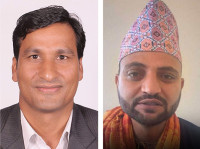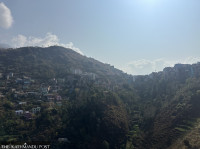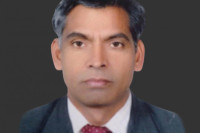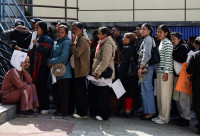National
Tribhuvan University accused of legitimising bogus UAE institutes
Students say CDC breached rules to recognise degree from Britts Imperial University College.
Binod Ghimire
Nepali students duped by bogus colleges in various cities in the United Arab Emirates have accused the Tribhuvan University of legitimising those institutions by granting equivalency to their training-level certificates as university degrees.
TU’s Curriculum Development Centre (CDC), which has the authority to grant equivalency to foreign degrees, is often criticised by students for making the process difficult, even for those who have graduated from the world’s reputable universities and colleges. However, the CDC has nonetheless granted equivalency to degrees issued by UAE-based training institutes which, according to the victimised students, are not authorised to award academic degrees.
A complaint lodged by the victims with the university and other government agencies states that the CDC has granted equivalency for Master’s in Business Administration in Hospitality offered by the Sharjah-based Britts Imperial University College, a training institution. The equivalency with reference number 14977 is against the university’s directives that guides the equivalency process. There may be more such cases, as per the students.
Section 17 of the directive says, “Equivalency can only be provided if the certificate has already been recognised/attested by the government of the country where the classes are physically conducted.”
However, the documents presented by students campaigning for justice under the banner “Scan the Scammers” show that the UAE government does not recognise the institution as a degree-awarding university, but only as a training institute.
“The bogus institutions have been presenting the equivalency by the Tribhuvan University to claim that their degrees are genuine,” said Bishwajeet Kumar Yadav, a returnee from the UAE who leads the Scan the Scammers campaign. The victims have been demanding that the equivalency certificates issued for non-academic courses be revoked and that action be taken against the officials involved.
CDC officials, meanwhile, say they are unaware of the matter. “I have no information on this to share with you,” said Sushil Dahal, a member at the CDC. However, Parasnath Yadav, who retired as the chief of the centre recently, said he remembers a similar complaint but cannot say what action was taken. “I suggest you talk to the current officials,” he said.
Dozens of Nepali students defrauded by bogus colleges and universities established in different free zones of the Gulf country are on continuous campaign demanding action against the education consultancies that cheated. They have filed complaints with the Ministry of Education, Ministry of Foreign Affairs and the police demanding refund of their money.
Most Nepali students paid between Rs750,000 and Rs1.5 million in fees and charges to the education consultancies.
Following pressure from students, the Ministry of Education, since November 14, has stopped issuing No Objection Certificates for the suspicious institutions. It is also investigating the matter.
Likewise, the Ministry of Foreign Affairs has urged Nepali students to properly verify the credibility of universities and training centres in the UAE operating from the free zones, before travelling for higher studies.
Free zones are designated areas in the UAE that operate under separate business regulations and often allow full foreign ownership, tax exemptions, and simplified customs procedures.
Issuing a statement on Friday, the Ministry of Education said it has been receiving complaints about institutions inside UAE’s free zones not meeting the required standards. Students have reported that some colleges claiming to be affiliated with foreign universities have no such links.
Others are found operating without their own buildings and running classes from rented apartments for a few months before shifting students to irregular online sessions, the ministry said.
Students say the training institutions branded themselves as universities by showcasing huge infrastructures and well equipped classes on their websites and in advertisements. However, the infrastructure and facilities showcased on their websites do not exist, according to the complaint.
Many of these so-called universities or colleges operate from just three or four small rooms, and students are instructed to attend classes online, the students said in their complaint.
Several students have returned home after finding that they were cheated. Since fiscal year 2023-24, more than 5,100 students have received no objection certificates from Nepal to study in the UAE even though the Gulf nation was little known as an academic destination until a few years ago.




 10.4°C Kathmandu
10.4°C Kathmandu














